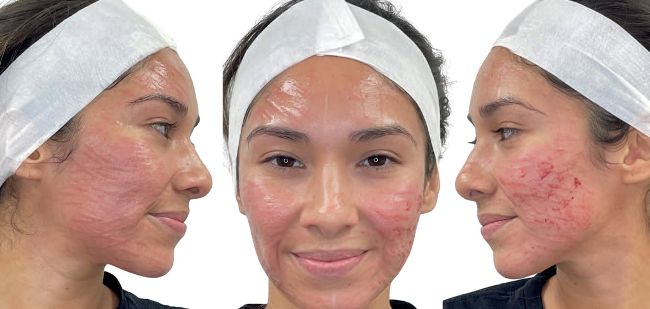The power of plant-based exosomes
How PDENs are offering a plant-based alternative to human exosomes
Exosomes have become one of the latest industry buzzwords, and for good reason. Although first discovered in mammalian cells in 1983, it is only now that science is figuring out their uses. Extensive research is being performed in sectors as varied as drug delivery, nutrition, chemical diagnostics and therapeutics. There is even research being done in the area of cancer prevention. In the field of aesthetics, in particular, they are offering new and exciting applications as a result of their potent regenerative functions, anti-inflammatory effects and synergistic use alongside energy-based devices to enhance healing and lessen downtime.
UNDERSTANDING EXOSOMES: THE CELLULAR MESSENGERS
Exosomes are tiny extracellular vesicles naturally produced by nearly all cells in the body. These nano-sized sacs, enclosed by a lipid membrane, play a vital role in facilitating cell-to-cell communication. They serve as carriers, transporting signalling molecules such as proteins and genetic material between cells, thereby influencing biological processes. When they encounter cells in need of repair, they initiate the process, setting the wheels in motion for cellular restoration.
Exosomes can be plant, animal or human-derived, and it’s this latter form that is controversial. In the UK, humanderived ingredients are banned, and while many people are using exosomes topically, claiming it’s okay as long as it’s not injected, there are questions about whether or not this is strictly legal.

Immediately post Fractora with EXO|E applied to left face only (pictures courtesy of American Laser Practice)
One of the reasons for this is regulatory and safety concerns. Since exosomes are derived from cells, there is a need to establish standardised manufacturing processes and quality control measures to ensure their safety, efficacy, and reproducibility. Additionally, the potential for off-target effects or unintended consequences of exosome-based therapies needs to be carefully evaluated, and research is still ongoing.
This is where plant-based alternatives are offering an interesting opportunity.
PLANT-BASED EXOSOMES OR PDENS
PDENs are Plant Derived Extracellular Nanoparticles. They are extracted from plant stem cells and are the plant version of human exosomes.
PDENs are, in simple terms, envelopes that carry messages from cell to cell.
In the last decade, research has discovered that plant stem cells produce human cytokine-like factors that allow for the use of secretory factors from plants for human cell signalling.1-4
For aesthetic applications, this means scientists can load these envelopes with thousands of biomimetic factors, including growth factors, peptides, liposomes, amino acids, and proteins directed explicitly to target inflammation as well as for wound healing angiogenesis and the stimulation of hyaluronic acid, collagen and elastin production.
INTRODUCING EXO|E
Recently launched in the UK via Aesthetic Medical Partnership (AMP), EXO|E Revitalizing Complex utilises biomimetic plant stem cell technology to rejuvenate and revitalise the skin.
The bio-based patented technology ensures perfect compatibility with the skin, helping to support and supplement its natural signalling mechanism to rebalance.
Most rejuvenation procedures cause inflammation, resulting in pain, swelling, redness, downtime, longer recovery, undesirable side effects and a negative patient experience or reluctance to repeat the procedure. EXO|E shifts the healing from inflammation to rejuvenation. This means less downtime and enhanced results from treatments.
Suitable for all skin types and conditions, the complete treatment protocol includes D|TOX, EXO|E, and RE|PAIR, which can be used both in-clinic and at home to prepare skin pre-procedure or enhance treatment outcomes.
It can also be used as a stand-alone treatment. The three-step process of EXO|E includes:
• D|TOX, which hydrates and prepares the skin for the upcoming aesthetic treatments
• EXO|E serum, which delivers concentrated stem cell factors for targeted results and desired outcomes
• RE|PAIR serum, which reinforces the work of EXO|E with additional extracellular nanoparticle technology and liposomes. One of the notable advantages of EXO|E is its ability to penetrate the skin transdermally through lipophilic absorption, enabling comprehensive treatment of the entire dermal architecture through efficient cell-tocell signalling.
Studies also show that EXO|E increases collagen and elastin production by 165% and 891%, respectively*, as well as increasing the secretion of hyaluronic acid by 198%** and providing a 61% daily reduction in inflammation***.
Miss Sherina Balaratnam, surgeon, cosmetic doctor and medical director of S-Thetics Clinic, was the first to introduce the product to her clinic. She says, “I am excited to be the first clinic in the UK and Europe and one of the first globally, outside of the US, to introduce the UK’s first completely plant-derived exosome product.
“I have spent over eight years understanding ingredient formulations and the science behind how botanically-derived topical skincare works. I have curated bespoke protocols with these topicals to produce highly regenerative results for my patients.
“Together with my previous knowledge and understanding of cell signalling from my research time at the University College of London (UCL 2004-5), these learnings have developed my knowledge of regenerative skin science.
“EXO|E delivers the next phase of topicals to fill in the missing links, such as the regeneration of one’s own elastin, hyaluronic acid and collagen production, up-regulated endogenously.
“This is only the second skincare system I have introduced to my clinic after eight years, illustrating the depth and breadth of the robust science, clinical validation and manufacturing processes behind EXO|E.”
* Quantification of collagen and elastin expression evaluated by qRT-PCR in human dermal fibroblasts with different treatments. P < 0.05
** Secretion of hyaluronic acid evaluated by ELISA in human dermal fibroblast
*** Human dermal endothelial cell invitro
REFERENCES
1. TengY, Xu F, Zhang X, et al. Plant-derived exosomal microRNAs inhibit lung inflammation induced by exosomes SARS-CoV-2 Nsp12. Mol Ther. 2021;29(8):2424-2440. doi:10.1016/j. ymthe.2021.05.005
2. Cui Y, Gao J, He Y, Jiang L. Plant extracellular vesicles. Protoplasma. 2020;257(1):3-12. doi:10.1007/s00709-019-01435-6
3. Dad HA, GuTW, ZhuAQ, Huang LQ, Peng LH. Plant Exosome-like Nanovesicles: Emerging Therapeutics and Drug Delivery Nanoplatforms. Mol Ther. 2021;29(1):13-31. doi:10.1016/j. ymthe.2020.11.030
4. Karamanidou,T.;Tsouknidas, A. Plant-Derived Extracellular Vesicles as Therapeutic Nanocarriers. Int. J. Mol. Sci.2022, 23, 191. https:// doi.org/10.3390/ijms23010191